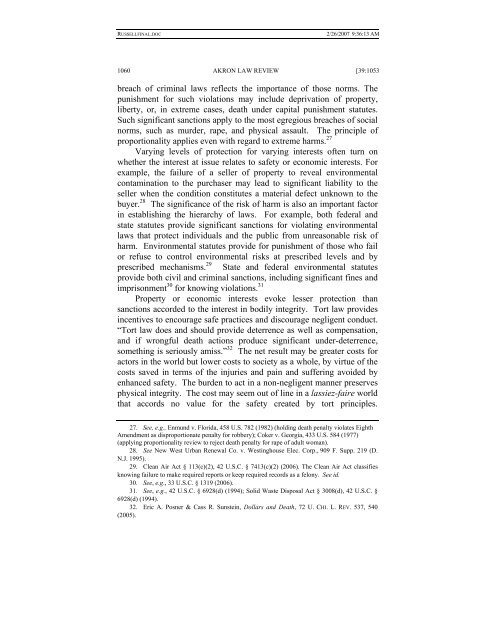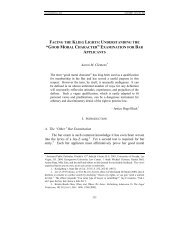THE LOGIC OF LEGAL REMEDIES AND THE RELATIVE WEIGHT ...
THE LOGIC OF LEGAL REMEDIES AND THE RELATIVE WEIGHT ...
THE LOGIC OF LEGAL REMEDIES AND THE RELATIVE WEIGHT ...
Create successful ePaper yourself
Turn your PDF publications into a flip-book with our unique Google optimized e-Paper software.
RUSSELLFINAL.DOC<br />
2/26/2007 9:36:13 AM<br />
1060 AKRON LAW REVIEW [39:1053<br />
breach of criminal laws reflects the importance of those norms. The<br />
punishment for such violations may include deprivation of property,<br />
liberty, or, in extreme cases, death under capital punishment statutes.<br />
Such significant sanctions apply to the most egregious breaches of social<br />
norms, such as murder, rape, and physical assault. The principle of<br />
proportionality applies even with regard to extreme harms. 27<br />
Varying levels of protection for varying interests often turn on<br />
whether the interest at issue relates to safety or economic interests. For<br />
example, the failure of a seller of property to reveal environmental<br />
contamination to the purchaser may lead to significant liability to the<br />
seller when the condition constitutes a material defect unknown to the<br />
buyer. 28 The significance of the risk of harm is also an important factor<br />
in establishing the hierarchy of laws. For example, both federal and<br />
state statutes provide significant sanctions for violating environmental<br />
laws that protect individuals and the public from unreasonable risk of<br />
harm. Environmental statutes provide for punishment of those who fail<br />
or refuse to control environmental risks at prescribed levels and by<br />
prescribed mechanisms. 29 State and federal environmental statutes<br />
provide both civil and criminal sanctions, including significant fines and<br />
imprisonment 30 for knowing violations. 31<br />
Property or economic interests evoke lesser protection than<br />
sanctions accorded to the interest in bodily integrity. Tort law provides<br />
incentives to encourage safe practices and discourage negligent conduct.<br />
“Tort law does and should provide deterrence as well as compensation,<br />
and if wrongful death actions produce significant under-deterrence,<br />
something is seriously amiss.” 32 The net result may be greater costs for<br />
actors in the world but lower costs to society as a whole, by virtue of the<br />
costs saved in terms of the injuries and pain and suffering avoided by<br />
enhanced safety. The burden to act in a non-negligent manner preserves<br />
physical integrity. The cost may seem out of line in a lassiez-faire world<br />
that accords no value for the safety created by tort principles.<br />
27. See, e.g., Enmund v. Florida, 458 U.S. 782 (1982) (holding death penalty violates Eighth<br />
Amendment as disproportionate penalty for robbery); Coker v. Georgia, 433 U.S. 584 (1977)<br />
(applying proportionality review to reject death penalty for rape of adult woman).<br />
28. See New West Urban Renewal Co. v. Westinghouse Elec. Corp., 909 F. Supp. 219 (D.<br />
N.J. 1995).<br />
29. Clean Air Act § 113(c)(2), 42 U.S.C. § 7413(c)(2) (2006). The Clean Air Act classifies<br />
knowing failure to make required reports or keep required records as a felony. See id.<br />
30. See, e.g., 33 U.S.C. § 1319 (2006).<br />
31. See, e.g., 42 U.S.C. § 6928(d) (1994); Solid Waste Disposal Act § 3008(d), 42 U.S.C. §<br />
6928(d) (1994).<br />
32. Eric A. Posner & Cass R. Sunstein, Dollars and Death, 72 U. CHI. L. REV. 537, 540<br />
(2005).
















